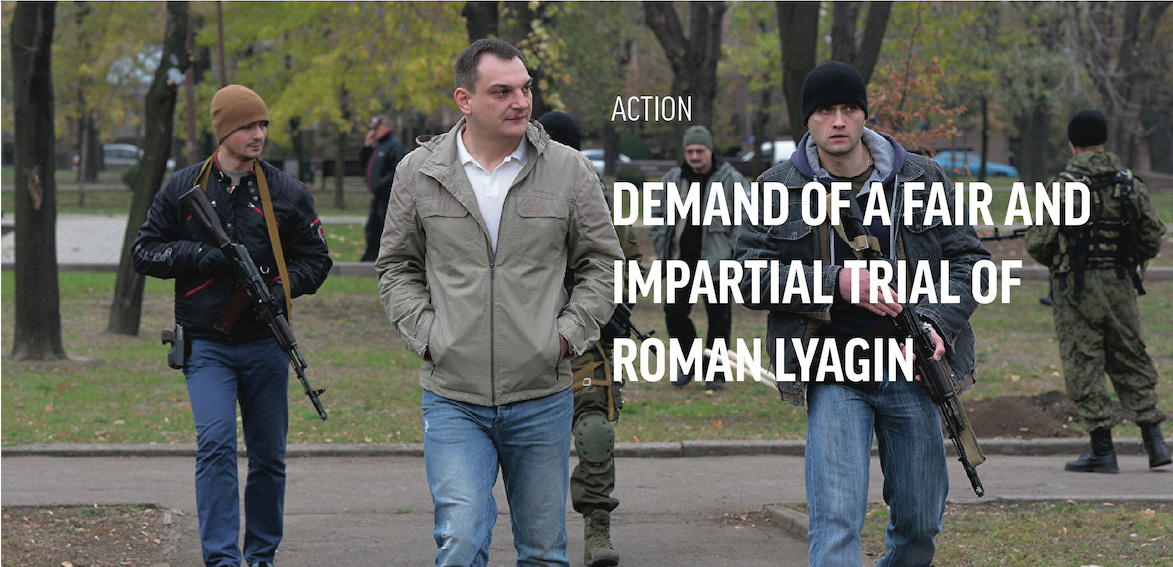Demand of a fair and impartial trial of Roman Lyagin

On the 1st of November 2019 at 02:30 pm former prisoners and torture victims of a secret prison in the Donetsk People’s Repub- lic, together with the civil activists, will hold a rally in front of the Shevchenkivskiy District Court in Kyiv (31А, Dehtyarivska street) on the occasion of the trial of Roman Lyagin who was the organizer of the referendum to create the Donetsk People’s Republic in Donetsk region in 2014.
They demand a fair and impartial trial of the separatist leader.
The trial commences at 03.00 pm. The judge presiding is Mrs. Mielieshak O.V.
Immediately after the trial a press briefing with the advocates of the victims and with those who suffered will take place next to the building of the Shevchenkivskiy District Court of Kyiv.
Participants:
Dmytro Potiekhin (blogger and former prisoner of the secret prison of “Donetsk People’s Republic” at IZOLYATSIA)
Other former prisoners of the secret prison of “Donetsk People’s Republic” (also invited)
Olga Reshetylova (coordinator, Media Initiative for Human Rights)
Ivan Chornyy (lawyer, “Golovan & Partners” Law firm)
During the press briefing the general public will have a chance to discuss the trial process and how completely and comprehensively the role of Roman Lyagin is being represented in this trial with respect to his broader involvement in the creation of the terrorist organization “the Donetsk People’s Republic” and specifically to his involvement in the seizure of the territory of IZOLYATSIA in Donetsk.
Contact details for the mass media:
Natalia Krasnenkova 067 465 54 26, krasnenkova@pr- house.com.ua,
Daria Kovalenko 095 419 67 98, [email protected]
Roman Lyagin was the former head of the Central Electoral Commission during the illegal referendum of May 11, 2014 regarding a self-determination of “Donetsk People’s Republic” and the ex-minister of Labor and Social Policy for the separatist republic. Under his direct guidance “fake” voting was arranged among the residents of Donetsk region resulting in the foundation of the terrorist organization “Donetsk People‘s Republic”.
Lyagin was revealed to be an initiator in the seizure of the territory of the International Charitable Foundation “IZOLYATSIA”
in Donetsk and was involved in its transformation into the secret prison of “The State Security Ministry of the Donetsk People’s Republic,” where Dmytro Potiekhin, Igor Kozlovskyy and Stanislav Aseyev were imprisoned. Lyagin is also an important witness to the involvement of Russian special forces in the occupation of Donbas, and is therefore able to contribute supporting evidence in the International Courts of the participation of the Russian Federation in military aggression against Ukraine. However, in order to make Lyagin and others of his kind fully answerable it is necessary to introduce changes in the legislation of Ukraine by passing a new bill regarding the prosecution of war criminals (the respective draft bill # 9438 is currently registered in the Ukrainian Parliament). After that Roman Lyagin may be held responsible pursuant to the principles of the international law.
Nevertheless, it is quite likely that Roman Lyagin will be granted amnesty or that the verdict, in his case, will be insufficient and not commensurate with the extent of damages incurred from his actions. In spite of the principles of the Criminal Procedure Code, the Shevchenkivskiy District Court of Kyiv has not acknowledge IZOLYATSIA as an aggrieved party in the case of Lyagin and has prevented the representatives of the offended party from participating in the preparatory meetings and in a realization of procedural law. A due notice on the criminal offence with respect to the activity of Lyagin that was submitted by IZOLYATSIA to the Security Service of Ukraine has not been given proper consideration and has not been added to the documents of the proceeding. It has rather been forwarded to an entirely different law enforcement agency with no relation to the case, which subsequently has initiated criminal proceedings aimed instead at the persecution of “arbitrariness” (or illegal civilian justice) committed by the armed groups of “the Donetsk People’s Republic.”
Considering the aforementioned attempts to restrict access to information on Lyagin’s case, there is still a risk that the agencies involved in the court proceedings have come to a cooperation agreement with Roman Lyagin that has not been disclosed to the general public or those who suffered directly from the formation of “the Donetsk People’s Republic” and victims of the secret prison. Furthermore, it is likely that such an undisclosed agreement contains conditions that may be entirely unacceptable to Ukrainain society at large.
This is why the trial should receive the maximum attention of the mass media, including a greater presence of journalists and activists at the trial, and at the subsequent open discussion of the trial’s results with the lawyers, court representatives and all those who have suffered from the actions of Roman Lyagin.